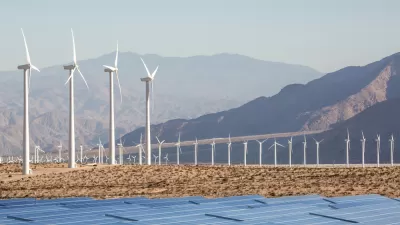The state’s energy plan focuses on the move to renewable energy, but specifics about how that will happen and what the costs will be need to be pinned down.

Tom Johnson writes about New Jersey’s efforts to transition to clean energy and the state’s Energy Master Plan. "The plan’s core recommendations are well-known — shifting away from climate-changing fossil fuels by switching to renewable energy sources, such as solar and wind power; a program to electrify the transportation sector; and to require gas and electric utilities to curb energy use by their customers."
The plan has not been released to the public yet, and the state has not yet outlined what the cost of these initiatives will mean for ratepayers. In the coming year, many outstanding issues will need to be resolved for the move to renewable energy, an expensive but necessary shift, notes Johnson.
"New Jersey has a 12-year-old law mandating it cut global warming emissions within the state by 80% below 2006 levels by 2050. Without shifting to a clean energy economy, the state could never achieve those goals," says Johnson.
FULL STORY: What Matters in 2020 as State Tries to Shift to Clean Energy? Money, for a Start

Maui's Vacation Rental Debate Turns Ugly
Verbal attacks, misinformation campaigns and fistfights plague a high-stakes debate to convert thousands of vacation rentals into long-term housing.

Planetizen Federal Action Tracker
A weekly monitor of how Trump’s orders and actions are impacting planners and planning in America.

San Francisco Suspends Traffic Calming Amidst Record Deaths
Citing “a challenging fiscal landscape,” the city will cease the program on the heels of 42 traffic deaths, including 24 pedestrians.

Defunct Pittsburgh Power Plant to Become Residential Tower
A decommissioned steam heat plant will be redeveloped into almost 100 affordable housing units.

Trump Prompts Restructuring of Transportation Research Board in “Unprecedented Overreach”
The TRB has eliminated more than half of its committees including those focused on climate, equity, and cities.

Amtrak Rolls Out New Orleans to Alabama “Mardi Gras” Train
The new service will operate morning and evening departures between Mobile and New Orleans.
Urban Design for Planners 1: Software Tools
This six-course series explores essential urban design concepts using open source software and equips planners with the tools they need to participate fully in the urban design process.
Planning for Universal Design
Learn the tools for implementing Universal Design in planning regulations.
Heyer Gruel & Associates PA
JM Goldson LLC
Custer County Colorado
City of Camden Redevelopment Agency
City of Astoria
Transportation Research & Education Center (TREC) at Portland State University
Jefferson Parish Government
Camden Redevelopment Agency
City of Claremont





























